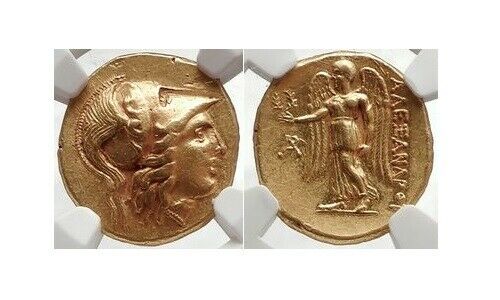-40%
Alexander The Great - Gold Stater NGC Certified
$ 5016
- Description
- Size Guide
Description
[ 6599 ]Greek Coin of
Macedonian Kingdom
Alexander III the Great - King of Macedonia: 336-323 B.C.
LIFETIME or Early Posthumous Issue
Gold Stater (8.55 gms), Byblos Mint, struck circa 330-320 B.C.
Reference: Price 3423
Pedigree / Provenance: Ex: Roma Numismatics Auction 9 March 2015, lot# 226.
Certification: NGC Ancients AU Strike: 4/5 Surface: 4/5 4531027-001
Helmeted head of Athena facing right, serpent on helm, monogram behind.
Nike standing left extending wreath, monogram in left field. Well centered, nicely struck and appealing.
Best known as
Alexander the Great
, he was a king (
basileus
in Greek) of the Ancient Greek kingdom of Macedonia. He was born in the city of Pella in 356 BC. By age 20, Alexander succeeded his father Philip II to the throne as king. He spent most of his years as king in an unprecedented military campaign of conquest through Asia, northeast Africa and even reached India. By age 30 he created one of the biggest empires in the ancient world, reaching from Greece to northwestern India. Being undefeated in battle, many consider him as one of history's most successful military commanders. He could be considered one of history's most important figures, having spread the Greek civilization far and wide, and was even admired by Julius Caesar along with many other important historical personages as well.
Provided with certificate of authenticity.
CERTIFIED AUTHENTIC
by Sergey Nechayev, PhD -
Numismatic Expert
Alexander III of Macedon
(20/21 July 356 BC - 10/11 June 323 BC), commonly known as
Alexander the Great
, was a king (
basileus
) of the Ancient Greek kingdom of Macedon and a member of the Argead dynasty. Born in Pella in 356 BC, Alexander succeeded his father, Philip II, to the throne at the age of twenty. He spent most of his ruling years on an unprecedented military campaign through Asia and northeast Africa, and by the age of thirty he had created one of the largest empires of the ancient world, stretching from Greece to northwestern India. He was undefeated in battle and is widely considered one of history's most successful military commanders.
During his youth, Alexander was tutored by the philosopher Aristotle until the age of 16. After Philip's assassination in 336 BC, Alexander succeeded his father to the throne and inherited a strong kingdom and an experienced army. Alexander was awarded the generalship of Greece and used this authority to launch his father's Panhellenic project to lead the Greeks in the conquest of Persia. In 334 BC, he invaded the Achaemenid Empire, and began a series of campaigns that lasted ten years. Following the conquest of Asia Minor, Alexander broke the power of Persia in a series of decisive battles, most notably the battles of Issus and Gaugamela. He subsequently overthrew the Persian King Darius III and conquered the Achaemenid Empire in its entirety. At that point, his empire stretched from the Adriatic Sea to the Indus River.
Seeking to reach the "ends of the world and the Great Outer Sea", he invaded India in 326 BC, but eventually turned back at the demand of his homesick troops. Alexander died in Babylon in 323 BC, the city he planned to establish as his capital, without executing a series of planned campaigns that would have begun with an invasion of Arabia. In the years following his death, a series of civil wars tore his empire apart, resulting in several states ruled by the Diadochi, Alexander's surviving generals and heirs.
Alexander's legacy includes the cultural diffusion his conquests engendered, such as Greco-Buddhism. He founded some twenty cities that bore his name, most notably Alexandria in Egypt. Alexander's settlement of Greek colonists and the resulting spread of Greek culture in the east resulted in a new Hellenistic civilization, aspects of which were still evident in the traditions of the Byzantine Empire in the mid-15th century and the presence of Greek speakers in central and far eastern Anatolia until the 1920s. Alexander became legendary as a classical hero in the mold of Achilles, and he features prominently in the history and mythic traditions of both Greek and non-Greek cultures. He became the measure against which military leaders compared themselves, and military academies throughout the world still teach his tactics. He is often ranked among the most influential people in human history, along with his teacher Aristotle.
Payment & Shipping:
Will accept payments via PayPal.









